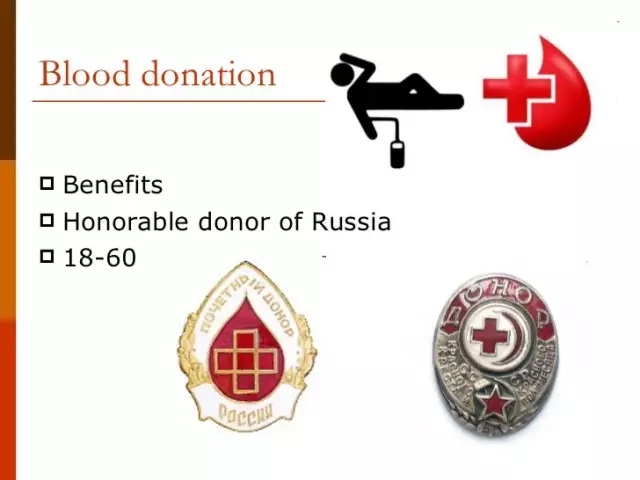- Author Rachel Wainwright wainwright@abchealthonline.com.
- Public 2023-12-15 07:39.
- Last modified 2025-11-02 20:14.
Organ donation in Russia: 8 features you need to know about
About 1,500 donor organ transplants are performed in Russia annually. This is several times less than in the USA, Great Britain, Brazil and many other countries. The development of treatment by the method of transplantation is impeded not only by outdated legislative acts, but also by the poor awareness of citizens in this area.
We will acquaint our readers with the data that seem to be the most important for understanding the peculiarities of transplantation in Russia.

Source: depositphotos.com
Presumption of consent
RF legislation on donation is based on the presumption of consent. This means that any deceased capable citizen is a candidate for donor. At the same time, every Russian has the right to communicate his desire or unwillingness to donate his organs and tissues for the benefit of people after death. This statement can be oral (made in the presence of two witnesses) or written. In the latter case, it must be certified by a notary or the head doctor of the hospital.
It should be noted that Russians very rarely announce their will regarding posthumous donation. In addition, the country has not yet created a federal register of such statements, so this system can hardly be called effective.
Rights of relatives of a deceased donor
This is one of the most problematic aspects of posthumous donation. According to the current legislation, the relatives of the deceased, in the absence of his lifetime consent, have the right to oppose the removal of organs for the purpose of transplantation. However, the law does not in any way regulate the doctor's actions in such a situation. The doctor must inform people about the death or dying state of a loved one, but he is not obliged to conduct a conversation about the possibility of posthumous donation. It turns out that the relatives of the deceased (dying) person should raise this issue on their own initiative. Needless to say, in most cases they are unable to do this (due to lack of awareness or due to a difficult emotional state). In addition, the relatives of the deceased may have different views on posthumous donation, and the law does not explainthe opinion of which of them should be decisive for the doctor. In such a situation, conflicts are inevitable, which harm both the medical staff and the family of the deceased.
Donor death diagnosis rules
This point is spelled out in the law most clearly: organs can be removed only if a person has been diagnosed with brain death or biological death, that is, cessation of breathing and heartbeat. The fact is that brain death does not always mean the termination of all vital functions of the body: in conditions of resuscitation, the heartbeat and breathing can be maintained with the help of equipment for several days.
The time of the beginning of the procedure for ascertaining brain death depends on the diagnosis and treatment that the patient received (in particular, on the drugs that were administered to him). For the diagnosis of brain death, a special council must meet. Its members study medical history and conduct research aimed at establishing the presence or absence of brain activity (computed tomography of the brain, testing the possibility of spontaneous breathing, etc.). The decision on brain death cannot be made earlier than after 6 hours of observation of the patient.
However, many transplantologists argue that this part of the legislation is imperfect. It is enough that for patients who were sedated (and this category includes almost all patients in intensive care units), the procedure for diagnosing brain death should be postponed for at least 20 hours. According to doctors, during this time, decay processes begin in the body, and by the time a decision is made about the possibility of removal, the organs are already unsuitable for transplantation.
Lifetime donation
Russian legislation provides for the possibility of intravital blood donation. It is not forbidden to transplant an organ or tissue to a child, sibling, one of the parents (but not to a husband or wife).
The exception is bone marrow donation: it can be shared with any person for whom the material is suitable in terms of tissue compatibility. There is a nationwide database of bone marrow donors. To register in it, it is enough to pass a blood test for typing. There are laboratories doing such research in many cities.
The possibility of buying organs
Paid organ donation in Russia is completely prohibited. All offers of this kind are criminal.
HIV donation
Persons infected with the human immunodeficiency virus are not eligible to donate. This prohibition applies to patients with viral hepatitis B and C, as well as to patients with malignant neoplasms.
Unidentified donors
The removal of organs from people who could not be identified after death is prohibited. The reasons for the ban are not related to either medical or moral and ethical considerations. Lawyers refer to the legislative norm, according to which only Russians can become donors, and it is not possible to determine the citizenship of a person who died unidentified.
Child donation
Until recently, little Russians who needed donor organ transplants could only count on the help of foreign clinics. The removal of organs from deceased children was not prohibited, but practically not carried out, since the procedure for diagnosing brain death in such patients was not regulated by law. In 2015, this omission was corrected, and doctors were able to remove organs from patients who died between the ages of 1 and 18. Of course, these procedures can only be carried out with the informed and written consent of the parents of the deceased.
The attitude of the majority of Russians towards posthumous donation can be characterized as negative. According to the results of opinion polls, about 20% of our fellow citizens do not wish to bequeath their organs for transplantation for religious reasons, although none of the official religions condemns donation. Particularly alarming is the fact that almost 40% of respondents are hesitant to give consent to posthumous organ harvesting for fear that their expression of will will cause unfair medical services or even provoke criminal actions of doctors.
It is obvious that the reason for such an attitude to an extremely important problem is the imperfection of the legislation. Since 2015, there has been a bill "On donation of human organs and their transplantation", prepared by the Ministry of Health, but still not considered by the State Duma of the Russian Federation. This document partially fills in the gaps in the legislation. For example, it contains provisions on the organization of a federal register of the will of potential donors, the absence of which prevents the use of even those limited opportunities that Russian transplantologists now have. The creation of an all-Russian register of recipients is also expected (today doctors have only regional waiting lists). However, according to experts, this draft law also contains norms that will not so much facilitate, but rather complicate the situation of patients.in need of transplantation. In particular, the list of organs permitted for removal does not include a kidney again, namely, its transplantation is shown to a huge number of patients.
The number of people in need of organ transplants will always outnumber potential donors. In our country, this problem is especially acute, and its solution, unfortunately, is a matter of a very distant future.
YouTube video related to the article:

Maria Kulkes Medical journalist About the author
Education: First Moscow State Medical University named after I. M. Sechenov, specialty "General Medicine".
Found a mistake in the text? Select it and press Ctrl + Enter.






